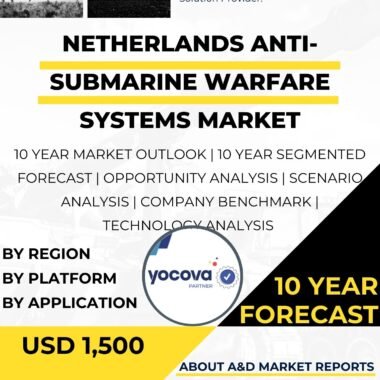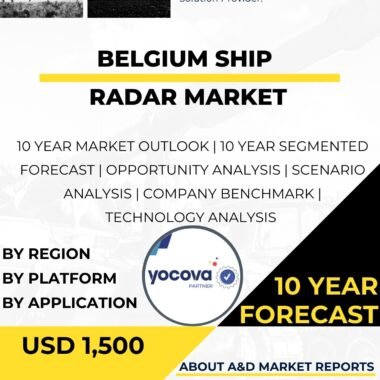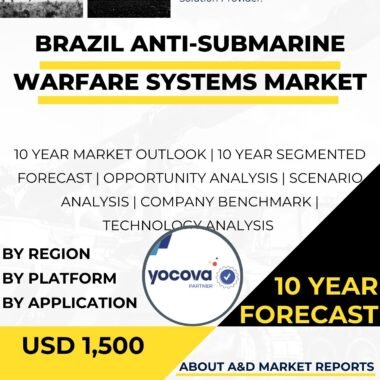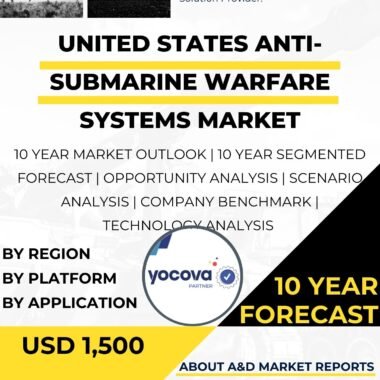Description
Spain Anti-Submarine Warfare Systems Market
Spain’s geographical location and maritime interests in the Mediterranean Sea and the Atlantic Ocean make it crucial to maintain a robust Spain anti-submarine warfare Systems Market capability. ASW systems are essential for detecting, tracking, and neutralizing submarines, thereby safeguarding national security and protecting vital maritime assets. In this article, we will explore the current state of the anti-submarine warfare systems market in Spain, key players, technological trends, challenges, and the potential for future growth.
As a coastal nation with a strong maritime tradition, Spain places significant importance on its naval capabilities, particularly in anti-submarine warfare. Submarines pose a unique threat to national security as they can operate stealthily, evade detection, and potentially disrupt shipping lanes or conduct covert activities. Effective ASW systems are critical for maintaining maritime supremacy and safeguarding the country’s territorial waters and exclusive economic zones.
The ASW systems market in Spain is characterized by ongoing modernization efforts and strategic investments in naval defense. Spain’s naval fleet consists of frigates, corvettes, and patrol vessels equipped with advanced ASW technologies. Key aspects of the current ASW systems market in Spain include:
Naval Modernization: Spain has been actively modernizing its naval fleet, retrofitting existing platforms with advanced ASW capabilities, and integrating state-of-the-art ASW systems into new naval vessels.
Collaborative Initiatives: Spain collaborates with other European and NATO partners on joint ASW exercises and initiatives to enhance interoperability and maritime security in the region.
Domestic Production: Spain’s defense industry plays a significant role in developing and manufacturing ASW systems, fostering national defense capabilities and contributing to the economy.
Several domestic and international companies are actively involved in providing ASW systems and technologies in Spain. Some key players include:
Navantia: As one of Spain’s leading shipbuilding companies, Navantia is involved in the design and construction of naval vessels with integrated ASW systems.
Indra Sistemas: A major Spanish technology company, Indra provides advanced electronic warfare and ASW solutions for naval platforms.
Thales Spain: A subsidiary of the multinational Thales Group, Thales Spain contributes to ASW technologies and systems for naval applications.
General Dynamics European Land Systems-Santa B?rbara Sistemas: Part of the General Dynamics group, this company specializes in defense systems, including ASW technologies.
The ASW systems market in Spain is witnessing several technological trends that are shaping the future of maritime defense:
Integrated Sensor Networks: ASW systems are becoming more sophisticated, leveraging integrated sensor networks that combine sonar, radar, and other sensors for improved detection and tracking of submarines.
Unmanned Systems: The use of unmanned underwater vehicles (UUVs) and unmanned aerial vehicles (UAVs) is gaining traction for autonomous ASW operations, enhancing situational awareness and extending operational reach.
Anti-Submarine Helicopters: ASW-capable naval helicopters equipped with advanced dipping sonars and other sensors are being utilized for effective submarine detection and prosecution.
Data Fusion and AI: Data fusion and artificial intelligence (AI) technologies are employed to process vast amounts of sensor data, enabling real-time threat assessment and decision-making.
The ASW systems market in Spain faces certain challenges that need to be addressed to ensure continued growth and operational effectiveness:
Cost and Budget Constraints: Developing and acquiring advanced ASW systems can be expensive, and budget constraints may limit the scope of modernization efforts.
Technological Advancements by Adversaries: As potential adversaries upgrade their submarine capabilities, Spain must continuously invest in cutting-edge ASW technologies to maintain superiority.
Undersea Environment Complexity: The underwater environment poses challenges to ASW operations due to acoustic propagation, changing oceanographic conditions, and potential interference.
. Geopolitical and Regional Security Concerns: Spain’s maritime security is influenced by geopolitical dynamics and regional challenges, necessitating flexible and adaptable ASW strategies.
The ASW systems market in Spain holds promising growth prospects, driven by several factors:
Defense Modernization Plans: Spain’s commitment to modernizing its naval forces, including ASW capabilities, indicates sustained demand for advanced ASW systems.
Maritime Security Imperatives: Ensuring maritime security and protecting national interests in a rapidly evolving maritime environment will drive the need for enhanced ASW systems.
Industry Collaboration: Collaborating with other European and NATO partners on ASW initiatives will foster mutual security interests and lead to shared technological advancements.
Technological Advancements: Ongoing developments in sensor technologies, AI, and unmanned systems will lead to more efficient and capable ASW solutions.
The anti-submarine warfare systems market in Spain plays a crucial role in ensuring maritime security and protecting the country’s coastal waters and interests. With ongoing defense modernization efforts, collaboration with international partners, and advancements in sensor technologies, Spain is poised to maintain a strong position in the ASW systems market. However, challenges related to budget constraints, evolving threat landscapes, and the complexities of undersea operations must be addressed for continued growth and operational effectiveness. By investing in cutting-edge ASW technologies and fostering collaboration, Spain can enhance its naval capabilities and remain a key player in the maritime defense arena.




